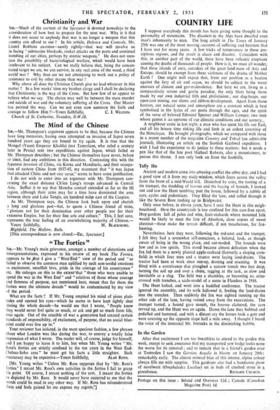t4 The Forties"
Sia,—Mr. Young's main grievance, amongst a number of distortions and misrepresentations, expressed in his review of my book The Forties. appears to be )hat I give a "West-End " view of the period and " so failed to observe the common man uplifted by such non-sordid emotions as excitement, unselfish love, pride in the courage of his countrymen" etc. He enlarges on this to the extent that " those who were unable to spend the war in the West End" and " relatives of those whose courage and firmness of purpose, not mentioned here, meant that for them the forties were the ultimate decade " would be contaminated by my view of the period.
What arc the facts ? If Mr. Young emptied his mind of pious plati- tudes and opened his eyes—which he seems to have kept tightly shut during the whole decade—he would see that I wrote, "People knew they would never feel quite so much, or ask and get so much from life, ever again. Out of the crucible of war a generation had created certain standards of responsibility, of excitement, of purpose, that no social blue- print could ever live up to."
Your reviewer has isolated, in the most specious fashion, a few phrases about what London was like during the war, to convey a totally false impression of what I wrote. The reader will, of course, judge for himself, .and I am happy to leave it to him, but when Mr. Young writes " Mr. Ross's forties are strictly confined to the ten years In the West End- Chelsea-Soho area " he must get his facts a little straighter. Such
Inaccuracy may be expensive.—Yours faithfully, ALAN Ross.
[Mr. Young writes " Unless Mr. Ross supposes that by ' Mr. Ross's forties' I meant Mr. Ross's own activities in the forties I fail to grasp his point. Of course, I meant nothing of the sort. I meant the forties as depicted by Mr. Ross. It would never have occurred to me that the words could be read in any other way. If Mr. Ross has misunderstood :hem and feels pained let me express my regrets."]


































 Previous page
Previous page